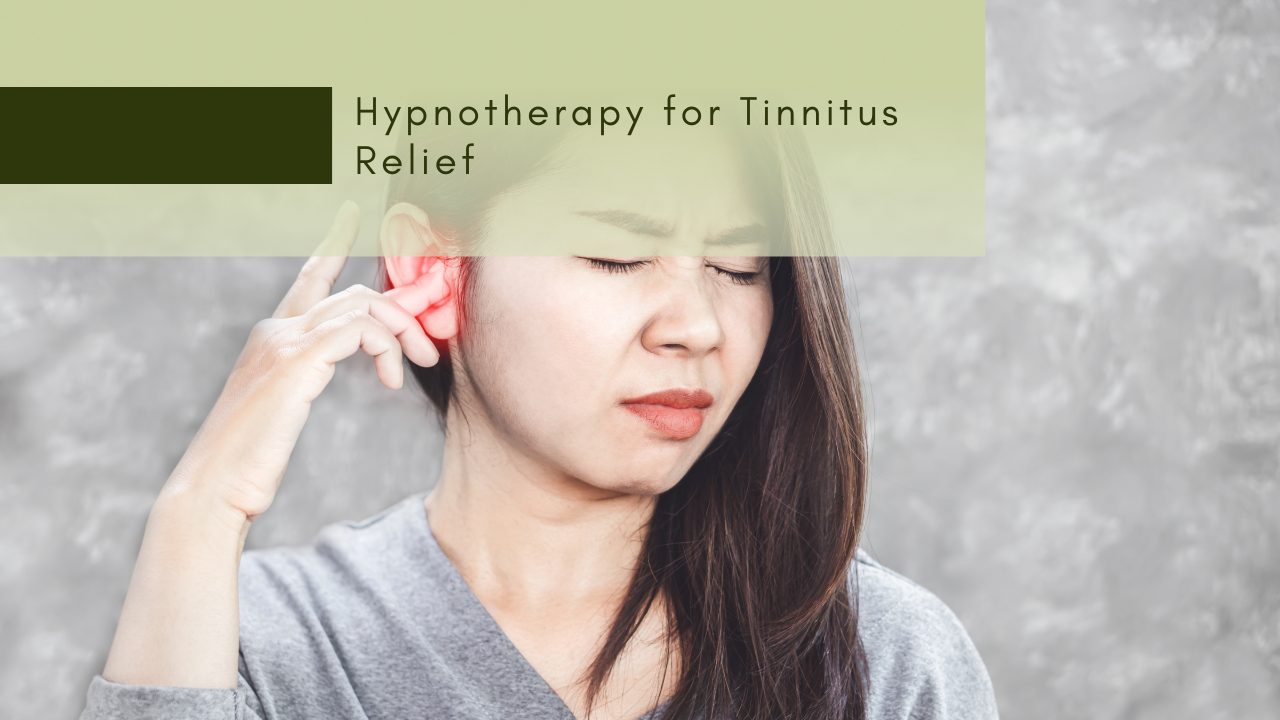The use of hypnotherapy for tinnitus typically involves addressing the emotional and psychological aspects of the condition rather than directly affecting the auditory system. In this article we will discuss the impact of hypnotherapy on tinnitus relief and how to find a hypnotherapist in Auckland to treat this issue.
Tinnitus: An Overview of Symptoms and Effects on Wellbeing
Tinnitus is the perception of noise or ringing in the ears when there is no external sound source. The symptoms of tinnitus can vary in intensity and may be constant or intermittent. Common symptoms include:
Ringing, Buzzing, or Hissing Sounds: Individuals with tinnitus often describe hearing sounds such as ringing, buzzing, hissing, whistling, or roaring in their ears.
Pitch Variability: Tinnitus sounds can vary in pitch, ranging from high-pitched tones to low-frequency sounds.
Intermittent or Continuous: Tinnitus may be continuous or intermittent, and its intensity can fluctuate.
Unilateral or Bilateral: Tinnitus can affect one ear (unilateral) or both ears (bilateral).
Pulsatile Tinnitus: Some people experience a rhythmic pulsing sound that coincides with their heartbeat.
Impact on Hearing: Tinnitus is a symptom itself and is not a direct cause of hearing loss, but it often coexists with hearing loss.
The effects of tinnitus on wellbeing can be significant and may include:
Sleep Disturbances: Tinnitus can interfere with sleep, making it difficult for individuals to fall asleep or stay asleep.
Stress and Anxiety: Persistent or bothersome tinnitus can lead to increased stress and anxiety, as individuals may find it challenging to cope with the constant noise.
Concentration and Focus Issues: The presence of tinnitus may make it difficult for individuals to concentrate on tasks, leading to issues with focus and attention.
Impact on Mental Health: Tinnitus has been associated with conditions such as depression and heightened levels of emotional distress.
Social Isolation: Some individuals with tinnitus may withdraw from social activities or situations where the noise may be more noticeable, leading to social isolation.
Negative Impact on Quality of Life: The persistent nature of tinnitus and its potential impact on sleep, mental health, and daily functioning can contribute to a reduced quality of life for some individuals.
It’s important to note that tinnitus is a symptom rather than a disease itself. It can be caused by various factors, including exposure to loud noise, age-related hearing loss, earwax blockage, certain medications, and underlying health conditions.
Hypnotherapy as a Non- Invasive Solution for Tinnitus
Hypnotherapy is considered a non-invasive therapeutic approach, and some individuals with tinnitus have explored hypnotherapy as part of their management strategy. However, it’s important to note that the effectiveness of hypnotherapy for tinnitus can vary among individuals, and scientific studies supporting its efficacy is limited.
Uncovering the Connection between Hypnotherapy and Tinnitus Relief
The use of hypnotherapy for tinnitus typically involves addressing the emotional and psychological aspects of the condition rather than directly affecting the auditory system. Here are some ways in which hypnotherapy might be applied for tinnitus:
- Stress Reduction: Hypnotherapy can help individuals manage stress and anxiety associated with tinnitus, which may, in turn, alleviate the perceived intensity of the symptoms.
- Coping Strategies: Hypnotherapy sessions may focus on developing coping strategies and changing thought patterns related to tinnitus, promoting a more positive mindset.
- Relaxation Techniques: Hypnotherapy often incorporates relaxation techniques, which can help individuals achieve a state of calmness and reduce the overall impact of stress on tinnitus.
- Enhanced Sleep: Since tinnitus can interfere with sleep, hypnotherapy may be used to address sleep-related issues and promote better sleep hygiene.
Getting Ready for Your Hypnotherapy Session for Tinnitus
Preparing for a hypnotherapy session for tinnitus involves both practical considerations and mental readiness. Here are some steps to help you get ready for your hypnotherapy session:
- Medical Evaluation: Before starting hypnotherapy, it’s essential to undergo a thorough medical evaluation to rule out any underlying medical conditions that may contribute to or exacerbate your tinnitus. Consult with an audiologist or an ear, nose, and throat (ENT) specialist.
- Set Realistic Expectations: Understand that while hypnotherapy may offer benefits for some individuals with tinnitus, it may not be a cure, and results can vary. Set realistic expectations for what you hope to achieve from the sessions.
- Identify Specific Goals: Clarify your goals for the hypnotherapy sessions. Whether it’s reducing stress, improving sleep, or changing your perception of tinnitus, having clear goals will help guide the hypnotherapy process.
- Create a Comfortable Environment: Find a quiet and comfortable space for your sessions, free from distractions and interruptions. This could be at the hypnotherapist’s office or a designated space at home.
- Wear Comfortable Clothing: Dress in comfortable clothing for the session to enhance your overall comfort and relaxation.
- Hydrate and Eat Lightly: Ensure you are adequately hydrated but avoid heavy meals before the session to prevent discomfort.
- Bring Relevant Information: If you’ve been keeping a journal of your tinnitus symptoms, bring it to the session. This information can help the hypnotherapist tailor the sessions to your specific experiences and challenges.
- Be Open and Honest: Establish open communication with your hypnotherapist. Share your experiences, concerns, and any changes in your condition since the last session. Honest communication helps the hypnotherapist understand your needs better.
- Maintain an Open Mind: Approach hypnotherapy with an open mind and a positive attitude. Trust the process and be receptive to the suggestions provided during the session.
Remember that hypnotherapy is a collaborative process, and your active participation and openness are crucial for its effectiveness. If you have any concerns or questions, discuss them with your hypnotherapist before or during the session.
Experiencing a Hypnotherapy Session for Tinnitus: What to Expect
During a hypnotherapy session for tinnitus, you can generally expect a collaborative and guided process aimed at addressing the emotional and psychological aspects of your experience with tinnitus. Here’s what you might typically encounter during a hypnotherapy session:
- Initial Consultation: The first session often begins with an initial consultation. The hypnotherapist will gather information about your medical history, tinnitus symptoms, and any relevant psychological or emotional factors.
- Goal Setting: You and the hypnotherapist will discuss your specific goals for the sessions. These goals may include reducing stress, improving sleep, changing your perception of tinnitus, or developing coping strategies.
- Relaxation Techniques: Hypnotherapy often involves relaxation techniques to help you achieve a state of deep relaxation. This may include guided imagery, progressive muscle relaxation, or focused breathing exercises.
- Induction: The hypnotherapist will guide you into a hypnotic or trance-like state through an induction process. This is not a state of unconsciousness but rather a heightened state of focus and receptivity.
- Suggestion and Visualisation: Once in a relaxed state, the hypnotherapist may introduce positive suggestions related to your tinnitus and its impact on your well-being. This can involve suggestions for reduced stress, improved sleep, or changing your perception of the tinnitus sounds.
- Exploration of Subconscious Mind: Some hypnotherapy sessions involve exploring the subconscious mind to identify and address any underlying emotional or psychological factors contributing to your experience of tinnitus.
- Coping Strategies: The hypnotherapist may work with you to develop coping strategies for managing tinnitus-related stress and anxiety. These strategies can be mental, emotional, or behavioral.
- Reprogramming Negative Thought Patterns: The hypnotherapist may help you reframe negative thought patterns and beliefs associated with tinnitus, encouraging a more positive mindset.
- Skill Building: You might learn and practice self-hypnosis techniques or other skills that empower you to manage tinnitus symptoms on your own between sessions.
- Discussion and Feedback: Throughout the session, there will be opportunities for discussion and feedback. You may share your experiences, and the hypnotherapist may offer guidance based on your responses.
- Number of Sessions: The number of sessions required can vary depending on individual needs and goals. Some individuals may benefit from a few sessions, while others may choose ongoing sessions for maintenance and support.
Selecting a Qualified Hypnotherapist for Tinnitus Treatment
Selecting a qualified hypnotherapist for tinnitus treatment involves careful consideration of their qualifications, experience, and approach. Below are some factors t o consider: hypnotherapist:
Qualifications:
Experience working with individuals with tinnitus or chronic conditions
Interview the Hypnotherapist: Schedule an initial consultation or interview with the hypnotherapist. This allows you to discuss your specific needs, ask questions about their approach, and assess whether you feel comfortable working with them.
Collaboration with Healthcare Providers: Check if the hypnotherapist is open to collaborating with your healthcare team, including audiologists or ENT specialists. This collaborative approach ensures a comprehensive treatment plan.
Ask About Treatment Approach: Discuss the hypnotherapist’s treatment approach for tinnitus. Ensure that it aligns with your goals and preferences. Some practitioners may use a combination of relaxation techniques, suggestion, and exploration of underlying issues.
Verify Ethical Standards: Confirm that the hypnotherapist adheres to ethical standards, including confidentiality and professional conduct.
Cost and Session Details: Clarify the cost of sessions and any potential additional fees. Discuss the duration and frequency of sessions, as well as the overall expected duration of treatment.
Remember that selecting a hypnotherapist is a personal choice, and it’s essential to feel comfortable and confident in your choice. Trust your instincts and be open to discussing your concerns or expectations during the initial consultation.




